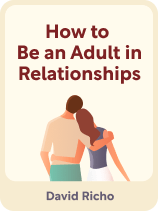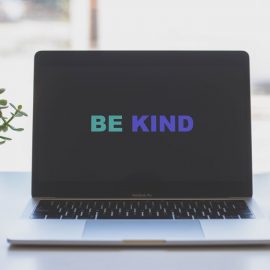

This article is an excerpt from the Shortform book guide to "How to Be an Adult in Relationships" by David Richo. Shortform has the world's best summaries and analyses of books you should be reading.
Like this article? Sign up for a free trial here.
Do you feel stuck in your life? How do healthy relationships encourage personal growth?
In How to Be an Adult in Relationships, David Richo says that mindfully loving relationships encourage psychological growth in three ways. These include the opportunity to process your issues, make compassionate validation possible, and improve your self-esteem.
Check out how mindfulness can spark personal growth in relationships.
Growth Factor #1: Relationships Provide Opportunities for Processing
Mindfully loving relationships are a space where you can explore and overcome the consequences of your childhood wounds, which is the first way you can experience personal growth in relationships. Richo explains that during the course of a relationship, you and your partner will inevitably trigger old memories of emotional pain. When this happens between two mindful adults, you can healthily address the conflict and the inner turmoil that has followed you from childhood into adulthood.
For example, if your partner snaps at you because the house is a mess, you might be upset—not just because your partner snapped at you, but also because it reminds you of all the times your parents snapped at you as a kid. If you’re both mindfully loving, you can process and work through it: You tell your partner how it makes you feel when they snap at you, and they validate your feelings. Then, together, you figure out healthier ways to deal with conflict in the future.
(Shortform note: When your partner triggers your childhood wounds, you may experience intense negative emotions and the impulse to lash out. Since lashing out can damage your relationship, learning how to better cope with triggers benefits you and your partner. One thing psychologists recommend when you’re triggered is to ask your partner to give you some space so you can process your feelings and figure out a rational approach to the conflict.)
Growth Factor #2: Relationships Provide Compassionate Support
Richo says that in addition to helping you work through your childhood wounds, your partner can support you through your adult wounds. For example, if you feel hurt after the end of a friendship, your partner might invite you to express that pain and make an effort to show you some extra affection when you need it. Compassionate validation from your partner ensures that you don’t feel alone and overwhelmed in your pain—instead, you feel connected and supported, which makes pain more tolerable.
(Shortform note: Compassionate support doesn’t just reduce emotional pain—it has a positive physical effect, too. Research demonstrates that emotional support from a romantic partner can help you tolerate pain better, make you feel less stressed, and influence you to make healthier choices for yourself. So, in the long run, receiving compassionate support from your partner can help you live longer.)
Growth Factor #3: Relationships Improve Your Self-Esteem
Intimate relationships also improve your self-esteem because when someone shows a romantic interest in you, it proves to you that you’re lovable. And, as the relationship deepens, you reveal your flaws and weaknesses, and you continue receiving your partner’s love, you’ll affirm that you’re worthy of love regardless of your imperfections.
(Shortform note: Partners, friends, and other loved ones boost your self-esteem by opening your eyes to your own good qualities with praise, encouragement, or acceptance of who you are. These boosts can help assuage your insecurities, but ultimately, your self-esteem comes down to how you feel about yourself. So, while your mindfully loving partner should contribute to your self-esteem to some extent, it’s important that you work on accepting yourself regardless of what others think of you.)

———End of Preview———
Like what you just read? Read the rest of the world's best book summary and analysis of David Richo's "How to Be an Adult in Relationships" at Shortform.
Here's what you'll find in our full How to Be an Adult in Relationships summary:
- The secret to a long-lasting, loving relationship
- How to overcome emotional wounds that hold you back from loving
- How the Buddhist concept of mindful loving can create a better world





